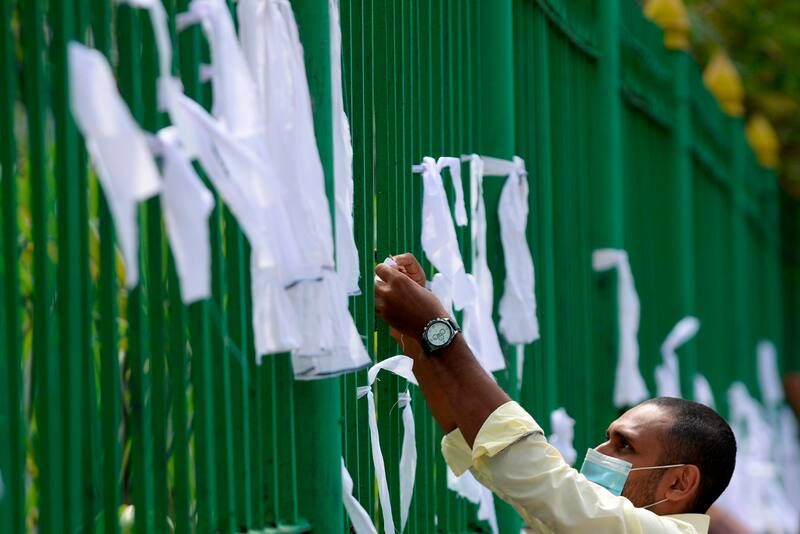
One of the most difficult things about the covid-19 pandemic has been the disruption of the ways in which we mourn. People have been unable to spend time with their loved ones in their dying moments, having to make do with a last glimpse over FaceTime instead. And as hospitals become overwhelmed, the waitlist for a plot to become available at a cemetery grows. For Muslims, this can be especially difficult, as Islam mandates that bodies be buried as soon as possible.
Losing loved ones and not being able to honor them with the usual religious rites and customs are hard enough when due to the logistics of an overburdened hospital system. But in Sri Lanka, Muslims are being forced to go through this trauma by design.
When the pandemic hit, the Sri Lankan government announced that it would mandate the cremation of the body of anyone who had tested positive for the coronavirus. The government expressed concerns that if burials were allowed, the virus could spread and contaminate the groundwater. For months, facing rising criticism, the Sri Lankan government hid behind the official excuse that this was a policy under review and one that was suggested by an expert committee. This month, the government made the guidance official.
However, there is no scientific evidence to back up this policy. The World Health Organization has said that there is no significant infection risk from burying bodies of people who have died from covid-19. Organizations such as the United Nations, Human Rights Watch and Amnesty International have also condemned the practice.
Experts believe the virus is primarily transmitted through respiratory and airborne droplets. Even with highly contagious viruses such as Ebola — where handling the dead body can easily transmit the virus — burials were permitted; in fact, in West Africa, highly specialized burial teams are thought to have saved thousands of lives through their work. The Sri Lankan government is considering sending Muslim bodies to the Maldives for burial, which begs the question: If bodies can be safely buried in the Maldives, why not Sri Lanka? Clearly, this is not about science or safety.
Sri Lanka is a country marred by ethnic tension and violence. Since the violent end to the Sri Lankan civil war, in which war crimes were committed, the Sinhalese-dominated government of Sri Lanka has only doubled down on its already abysmal human rights record. It has refused to provide any answers on Tamil fighters and civilians who were disappeared at the end of the war, jailed journalists and lawyers, and promoted a violent brand of religious nationalism. For the past decade, violence against Muslims in particular has increased. Anti-Muslim riots took place in 2014 and 2018, with attacks on mosques, Muslim homes and businesses. This campaign escalated after the 2019 Easter Sunday attacks in Colombo, with further mob violence and a pretext for new government suppression. The policy to cremate bodies must be viewed in this context.
Almost a year of this pandemic, according to estimates from the Muslim Council of Sri Lanka, more than 80 Muslims have been cremated — including a 20-day-old child and a 44-year-old mother whose coronavirus test came back negative after she was cremated. To add insult to injury, the government is requesting a fee of 48,000 rupees (about $240) to cremate the bodies. In response, Muslim families, not wanting to be complicit in the desecration of their loved ones, have disowned their loves ones or refused to pay. As a result, bodies have piled up in the mortuary. Sri Lanka’s attorney general recently ordered the unclaimed bodies to be cremated anyway.
This type of action not only undermines human rights and the dignity of the dead, but also has grave implications for controlling the virus. People may be afraid to get medical care, for fear of getting a coronavirus test when exhibiting symptoms. Members of the Muslim community may also be distrustful of any vaccine that the government administers. This is on top of the psychological impacts of the policy on people who are already dealing with the toll of isolation during a deadly pandemic.
Despite months of protests from the Muslim community and human rights activists, the Sri Lankan government is moving forward with this baseless and discriminatory policy. In December, the supreme court rejected a challenge from human rights organizations, dashing any hope that the guidance may have been reversed. In response to the ruling, members of the public tied thousands of white ribbons to the gate of the crematorium as an act of remembrance and peaceful protest; the government responded by swiftly removing them.
The government has temporarily succeeded in its quest to inflict emotional harm on our community. But they cannot crush the power of our resilience.
Abdullah Shihipar is a writer. He leads Narrative Projects and Policy Initiatives at the Marshall Research Lab at the Brown University School of Public Health.
